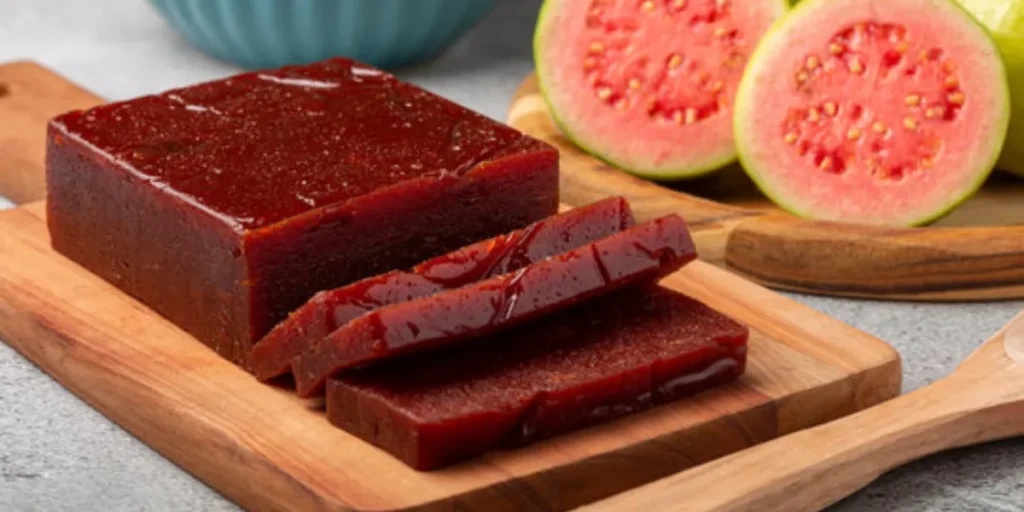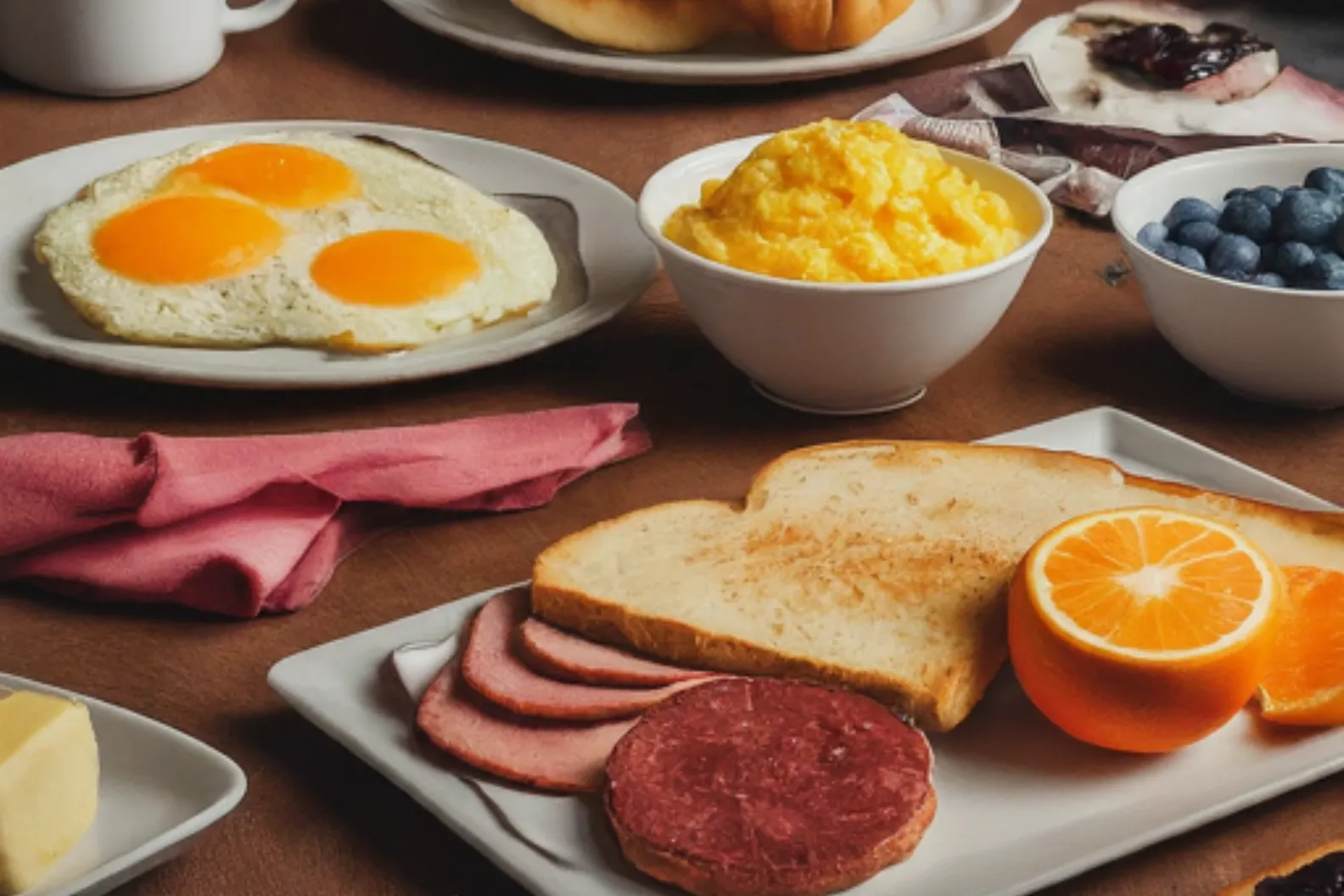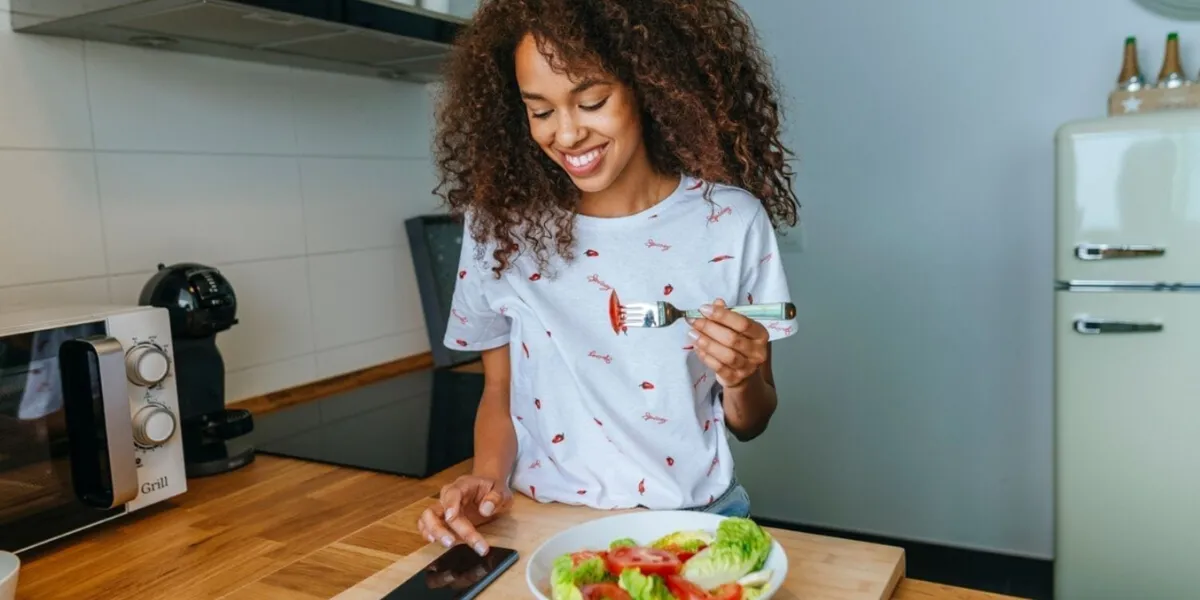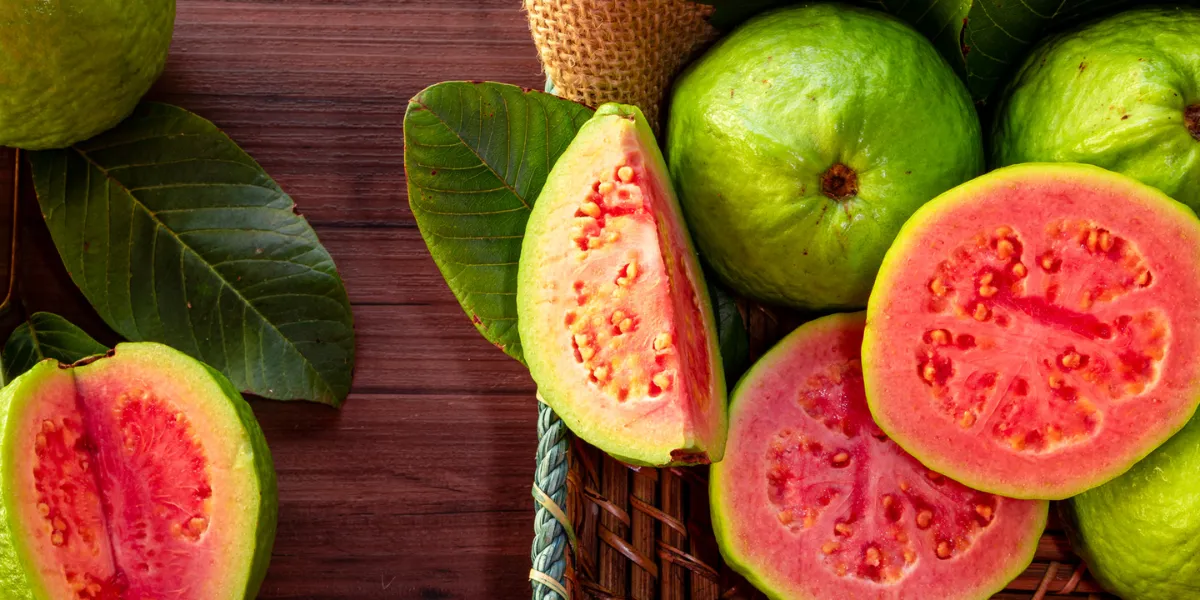Guava paste, a vibrant and flavorful ingredient, is a delightful addition to both sweet and savory dishes. This tropical treat boasts a rich history and versatility that can elevate your culinary creations. This article will be your one-stop guide to guava paste, exploring everything from its origins to its uses and everything in between.
Table of Contents
ToggleWhat is Guava Paste?
Guava paste, also known as goiabada (Portuguese) or pasta de guayaba (Spanish), is a thick and concentrated puree made from guavas, sugar, and sometimes additional ingredients like pectin. The guavas are cooked down until most of the moisture evaporates, resulting in a paste-like consistency that’s firmer than jam but softer than fruit leather. It typically has a deep reddish-brown color and an intense guava flavor with a hint of sweetness.
A Look at the Varieties
Guava paste comes in a variety of textures, depending on the brand and preparation method. Here’s a breakdown of the most common types:
- Brick-style: This is the most widely available type. It’s quite firm and can be sliced into squares or cubes.
- Spreadable: This variety is softer and more spreadable, similar to jam.
- Candied: These are small, bite-sized pieces of guava paste often dusted with sugar for a delightful textural contrast.
Table 1: Guava Paste Varieties
| Variety | Texture | Uses |
|---|---|---|
| Brick-style | Firm, sliceable | Appetizers, fillings, sauces |
| Spreadable | Soft, spreadable | Tarts, pastries, sandwiches |
| Candied | Bite-sized pieces | Snacks, desserts |
A Journey Through History: The Origins of Guava Paste
The origins of guava paste can be traced back to Central and South America, where guava trees are native. Indigenous communities likely developed the technique of concentrating guava pulp to preserve the fruit’s deliciousness during off-seasons. The practice spread with Spanish colonization, reaching the Caribbean and eventually becoming a staple ingredient in many Latin American cuisines. Today, guava paste is enjoyed worldwide, adding a touch of the tropics to kitchens everywhere.
The Sweet and the Savory: Uses for Guava Paste
Guava paste’s unique flavor profile makes it a versatile ingredient that can be used in various ways. Here’s a breakdown of its culinary applications:
In Savory Dishes:
- Cheese Pairings: A classic combination in Latin America, guava paste’s sweetness beautifully complements the richness of cheeses like Manchego, queso fresco, or goat cheese. Serve sliced guava paste alongside cheese for a simple yet elegant appetizer.
- Empanada Fillings: Guava paste is a popular filling for both sweet and savory empanadas. It adds a vibrant flavor layer to meat or cheese fillings.
- Sauces and Glazes: Guava paste’s concentrated flavor can be used to create delicious sauces and glazes for meats like chicken or pork. Simply whisk it into pan drippings or a sauce base for a tangy and sweet enhancement.
In Sweet Treats:
- Pastries and Desserts: Guava paste is a common filling for pastries like pastelitos, guava cheese danishes, and turnovers. It can also be swirled into ice cream or yogurt for a burst of fruity flavor.
- Cakes and Cheesecakes: Use guava paste as a layer in cakes or cheesecakes for a delightful surprise. It can also be incorporated into the batter for a subtle guava taste throughout.
- Fruit and Cheese Boards: Offer cubed guava paste on a cheese board alongside fresh fruits like grapes, pears, or apples for a visually appealing and flavorful arrangement.
Tips for Using Guava Paste:
- Softening Brick-Style Guava Paste: To make brick-style guava paste easier to use, you can soften it in a few ways: Microwave it on low power for short bursts until softened, or steam it for a few minutes.
- Adding Extra Flavor: Feel free to experiment with adding spices like cinnamon, cloves, or nutmeg to the guava paste for a more complex flavor profile.
10 FAQs About Guava Paste
- Is guava paste the same as guava jelly? No, guava paste is much thicker and denser than guava jelly. It’s also less sweet due to the higher concentration of fruit.
- Where can I buy guava paste? Guava paste can be found in Latin American grocery stores, well-stocked international aisles of supermarkets, or online retailers.
Does guava paste need to be refrigerated?
Unopened guava paste: No, unopened guava paste typically does not require refrigeration. Due to its high sugar content and sealed packaging, it can be stored in a cool, dark, and dry pantry for up to a year.
Opened guava paste: Once you open the package, however, refrigeration becomes crucial. The exposure to air increases the risk of mold growth and spoilage. Here’s how to store opened guava paste:
- Transfer: Remove the guava paste from its original packaging and transfer it to an airtight container. This could be a glass jar with a lid, a plastic container with a tight seal, or even a resealable bag.
- Refrigerate: Place the container in your refrigerator.
- Use within: Consume the opened guava paste within 3 months for the best quality and flavor.
Signs of Spoilage: How can you tell if your guava paste has gone bad? Here are some signs to watch out for:
- Mold: The presence of any mold growth on the surface is a clear indication that the guava paste is no longer safe to consume. Discard it immediately.
- Off-odors: If the guava paste develops an unpleasant or sour odor, it’s best to err on the side of caution and throw it away.
- Discoloration: While the color of guava paste can vary slightly, a significant color change, especially if it becomes dark or brownish, could indicate spoilage.
Nutritional Value of Guava Paste
Guava paste is a good source of vitamins and minerals, particularly vitamin C, dietary fiber, and potassium. However, it’s important to remember that it’s also high in sugar. Consume it in moderation as part of a balanced diet.
Table 2: Nutritional Value of Guava Paste (per 1 tablespoon serving)
| Nutrient | Amount | Daily Value (DV) |
|---|---|---|
| Calories | 52 | 2% |
| Total Fat | 0.1 g | <1% |
| Saturated Fat | 0 g | 0% |
| Cholesterol | 0 mg | 0% |
| Sodium | 2 mg | <1% |
| Total Carbohydrates | 13 g | 4% |
| Dietary Fiber | 0.4 g | 2% |
| Sugars | 12 g | N/A |
| Protein | 0.2 g | <1% |
| Vitamin C | 2 mg | 2% |
| Potassium | 32 mg | 1% |
(Source: USDA National Nutrient Database for Standard Reference)

What is Guava Paste Used For?
Guava paste, also known as “goiabada,” is a sweet and dense fruit paste made from guava fruit. It is commonly used in various culinary applications, including:
- Desserts: Guava paste is often used as a filling or topping for desserts such as cakes, pastries, tarts, and cookies. Its sweet and tangy flavor adds a tropical twist to traditional baked goods.
- Cheese Platters: Guava paste pairs exceptionally well with cheese, especially creamy and mild varieties like cream cheese or brie. It is often served alongside cheese platters or charcuterie boards as a sweet and savory accompaniment.
- Sauces and Glazes: Guava paste can be melted down and used to make sauces, glazes, or marinades for meats, poultry, or seafood dishes. Its rich flavor and thick consistency add depth and complexity to savory recipes.
- Beverages: Guava paste can be dissolved in hot water to make a sweet and fruity guava tea or mixed into cocktails and mocktails for added flavor and sweetness.
- Snacks: Guava paste can be enjoyed on its own as a sweet treat or combined with other ingredients to make snack bars, energy bites, or fruit leather.
What is Another Name for Guava Paste?
Another name for guava paste is “goiabada.” This term is commonly used in Portuguese-speaking countries, particularly in Brazil, where guava paste is a popular ingredient in desserts and traditional dishes.
Is Guava Paste Halal?
Guava paste is typically considered halal, as it is made from natural ingredients and does not contain any prohibited substances or additives. However, it’s always a good idea to check the ingredient list and verify the halal certification if you have specific dietary restrictions or preferences.
Can You Eat Guava Paste by Itself?
Yes, you can eat guava paste by itself as a sweet and flavorful snack. Guava paste has a dense and sticky texture with a sweet and tangy flavor, making it a delicious treat on its own. It can be sliced into small pieces and enjoyed as is or paired with cheese or crackers for a sweet-savory combination.
Is Guava Paste Good for Skin?
Guava paste contains vitamins, minerals, and antioxidants that can benefit the skin when consumed as part of a balanced diet. However, applying guava paste directly to the skin may not provide significant benefits and could potentially cause irritation or allergic reactions in some individuals. For skincare purposes, it’s best to focus on a healthy diet rich in fruits, vegetables, and other nutrient-rich foods, along with a proper skincare routine tailored to your skin type and concerns.
Is it OK to Eat Guava Skin?
Yes, it is safe to eat guava skin, although some people may prefer to peel the guava before consuming it. Guava skin is edible and contains additional fiber and nutrients, so eating it can provide extra nutritional benefits. However, be sure to wash the guava thoroughly before eating to remove any dirt, pesticides, or contaminants.
What are the Disadvantages of Guava?
While guava offers numerous health benefits, there are a few potential disadvantages to consider:
- High Fiber Content: Guava is high in fiber, which can cause digestive discomfort or bloating in some individuals, especially if consumed in large quantities.
- Allergies: Some people may be allergic to guava or experience allergic reactions to certain compounds found in the fruit, such as pollen or proteins.
- Blood Sugar Levels: Although guava has a relatively low glycemic index, consuming large amounts of ripe guava or guava products may cause blood sugar levels to spike in individuals with diabetes or insulin resistance.
- Seed Hardness: The seeds of some guava varieties can be hard and challenging to chew, potentially posing a choking hazard, especially for young children.
- Pesticide Residue: Non-organic guavas may contain pesticide residues, which could pose health risks if consumed in excess or if not washed thoroughly before eating.
Overall, while guava offers numerous health benefits, it’s essential to consume it in moderation as part of a balanced diet and be mindful of any potential adverse effects, especially for individuals with specific dietary concerns or medical conditions.
Does Guava Brighten Skin?
Guava contains vitamin C, antioxidants, and other nutrients that can help promote skin health and may contribute to a brighter complexion. Consuming guava as part of a balanced diet can provide your skin with essential nutrients and hydration, but it’s essential to combine it with a proper skincare routine for optimal results.
Who Should Not Eat Guava?
While guava is generally safe for consumption for most people, there are a few instances where individuals may need to exercise caution or avoid guava altogether:
- Allergies: Individuals with a known allergy to guava or related fruits such as kiwi, pineapple, or strawberries should avoid consuming guava to prevent allergic reactions.
- Gastrointestinal Issues: Some people may experience digestive discomfort or exacerbation of gastrointestinal conditions such as irritable bowel syndrome (IBS) or gastroesophageal reflux disease (GERD) after consuming guava, particularly if they have a sensitivity to high-fiber foods.
- Blood Sugar Concerns: Individuals with diabetes or those who need to monitor their blood sugar levels should consume guava in moderation and be mindful of its natural sugar content to avoid spikes in blood glucose levels.
- Medication Interactions: Guava may interact with certain medications or supplements, particularly blood-thinning medications like warfarin, due to its vitamin K content. If you are taking medications or have any underlying health conditions, consult with a healthcare professional before adding guava to your diet.
Conclusion
Guava paste, with its vibrant color, intense flavor, and versatility, is a delightful addition to any kitchen. Whether you’re using it to elevate savory dishes or indulge your sweet tooth, this tropical treat offers a unique and delicious experience. So next time you’re looking for a new ingredient to explore, consider reaching for a package of guava paste and embark on a culinary adventure.














